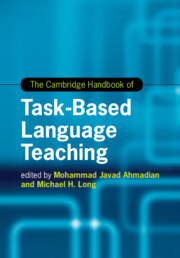Book contents
- The Cambridge Handbook of Task-Based Language Teaching
- Cambridge Handbooks In Language And Linguistics
- The Cambridge Handbook of Task-Based Language Teaching
- Copyright page
- Dedication
- Contents
- Figures
- Tables
- Contributors
- Preface The Origins and Growth of Task-Based Language Teaching
- Part I The Rationale for Task-Based Language Teaching
- Part II Tasks and Needs Analysis
- Part III The Task Syllabus and Materials
- Part IV Methodology and Pedagogy
- Part V Task-Based Language Teaching with School-Age Children
- Part VI The Teacher in Task-Based Language Teaching
- Part VII Task-Based Assessment and Program Evaluation
- Part VIII Research Needs and Future Prospects
- 15 Methodological Approaches to Investigating Task-Based Language Teaching
- 16 Task-Based Language Teaching as an Innovation
- 17 The Adoption of Task-Based Language Teaching in Diverse Contexts
- Conclusion
- Index
- References
Conclusion
from Part VIII - Research Needs and Future Prospects
Published online by Cambridge University Press: 19 November 2021
- The Cambridge Handbook of Task-Based Language Teaching
- Cambridge Handbooks In Language And Linguistics
- The Cambridge Handbook of Task-Based Language Teaching
- Copyright page
- Dedication
- Contents
- Figures
- Tables
- Contributors
- Preface The Origins and Growth of Task-Based Language Teaching
- Part I The Rationale for Task-Based Language Teaching
- Part II Tasks and Needs Analysis
- Part III The Task Syllabus and Materials
- Part IV Methodology and Pedagogy
- Part V Task-Based Language Teaching with School-Age Children
- Part VI The Teacher in Task-Based Language Teaching
- Part VII Task-Based Assessment and Program Evaluation
- Part VIII Research Needs and Future Prospects
- 15 Methodological Approaches to Investigating Task-Based Language Teaching
- 16 Task-Based Language Teaching as an Innovation
- 17 The Adoption of Task-Based Language Teaching in Diverse Contexts
- Conclusion
- Index
- References
Summary
In the Introduction, we asked, “If TBLT is so good, why isn’t it more widely used?” In this closing chapter, we address a number of areas where further exploration might increase its acceptance and adoption.
- Type
- Chapter
- Information
- The Cambridge Handbook of Task-Based Language Teaching , pp. 671 - 675Publisher: Cambridge University PressPrint publication year: 2021

